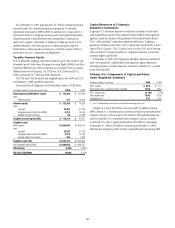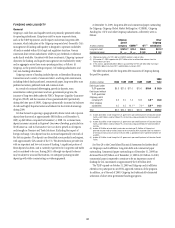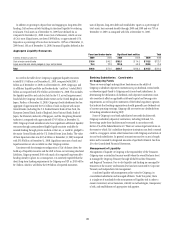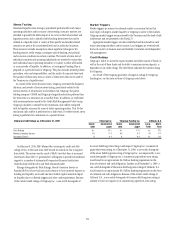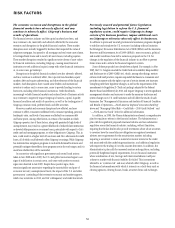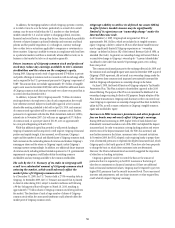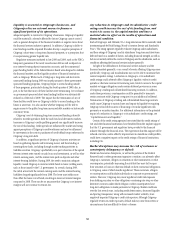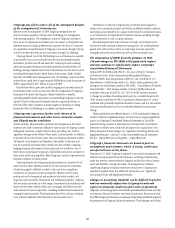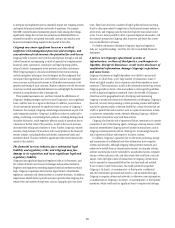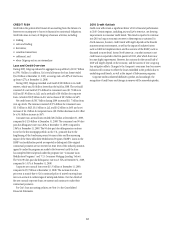Citibank 2009 Annual Report Download - page 65
Download and view the complete annual report
Please find page 65 of the 2009 Citibank annual report below. You can navigate through the pages in the report by either clicking on the pages listed below, or by using the keyword search tool below to find specific information within the annual report.55
The House Financial Services Committee began considering legislation
based on the Administration’s proposal, and in December 2009, the U.S. House
of Representatives passed the Wall Street Reform and Consumer Protection Act.
The bill calls for comprehensive financial regulatory reform and would create
a Consumer Protection Agency whose mandate includes measures that would
subject federally chartered financial institutions to state consumer protection
laws that have historically been preempted. The bill would also provide Federal
regulators with the authority to rein in or dismantle financial institutions
whose collapse could pose a systemic risk to the financial stability or economy
of the U.S. due to their size, leverage or interconnectedness. The Senate
Banking, Housing and Urban Affairs Committee also issued a discussion draft of
a bill in November 2009 based on the Administration’s proposal, which differs
significantly from the House bill in many respects.
More recently, in early 2010, the Obama Administration proposed further
restrictions on the size and scope of banks and other financial institutions.
There can be no assurance as to whether or when any of the parts of the
Administration’s plan or other proposals will be enacted into legislation
and, if adopted, what the final provisions of such legislation will be. New
legislation and regulatory changes could require Citigroup to further change
certain of its business practices, impose additional costs on Citigroup, some
significant, adversely affect its ability to pursue business opportunities it
might otherwise consider engaging in, cause business disruptions or impact
the value of assets that Citigroup holds.
Citigroup’s participation in government programs to
modify first and second lien mortgage loans could
adversely affect the amount and timing of its earnings
and credit losses relating to those loans.
The U.S. Treasury has announced guidelines for its first and second lien
modification programs under the Home Affordable Modification Program
(HAMP). Citigroup began participating in the HAMP with respect to first
mortgages during the second quarter of 2009 and is actively engaged in
discussions with the U.S. Treasury for the second lien program.
Participation in the HAMP could result in a reduction in the principal
balances of certain first and second lien mortgage loans and the acceleration of
loss recognition on those loans. In addition to the principal reduction aspect of
the programs, loan modification efforts can impact the interest rate and term of
these loans, which would in turn impact the total return on those assets and the
timing of those returns. Participation in the programs as a servicer could also
reduce servicing income to the extent the principal balance of a serviced loan is
reduced or because it increases the cost of servicing a loan.
In order to participate in the HAMP, borrowers must currently complete
a three- to five-month trial period during which the original terms of the
loans remain in effect pending final modification. As a result, Citigroup is
uncertain of the overall impact the HAMP will have on its delinquency trends,
net credit losses and other loan loss metrics.
The expiration of a provision of the U.S. tax law that
allows Citigroup to defer U.S. taxes on certain active
financial services income could significantly increase
Citi’s tax expense.
Citigroup’s tax provision has historically been reduced because active
financing income earned and indefinitely reinvested outside the U.S. is
taxed at the lower local tax rate rather than at the higher U.S. tax rate. Such
reduction has been dependent upon a provision of the U.S. tax law that defers
the imposition of U.S. taxes on certain active financial services income until
that income is repatriated to the U.S. as a dividend. This “active financing
exception” expired on December 31, 2009, and while it has been scheduled
to expire on five prior occasions and has been extended each time, there can
be no assurance that the exception will continue to be extended. The Obama
Administration’s 2011 budget proposal includes a two-year extension of the
active financing exception. In addition, the U.S. House of Representatives has
passed a one-year extension of the exception that is now pending a vote in
the U.S. Senate. In the event this exception is not extended beyond 2009, the
U.S. tax imposed on Citi’s active financing income earned outside the U.S.
would increase, which could further result in Citi’s tax expense increasing
significantly.
Citigroup’s businesses are subject to risks arising from
extensive operations outside the United States.
As a global participant in the financial services industry, Citigroup is
subject to extensive regulation, including fiscal and monetary policies, in
jurisdictions around the world.
As a result of the current financial crisis, there are currently numerous
reform efforts underway outside the U.S., including without limitation
proposals by the European Commission to amend bank capital requirements
and by the Financial Services Authority in the United Kingdom to enhance
regulatory standards applicable to financial institutions. This level of
regulation could further increase in all jurisdictions in which Citigroup
conducts business. Any regulatory changes could lead to business disruptions
or could impact the value of assets that Citigroup holds or the scope or
profitability of its business activities. Such changes could also require
Citigroup to change certain of its business practices and could expose
Citigroup to additional costs, including compliance costs, and liabilities as
well as reputational harm. To the extent the regulations strictly control the
activities of financial services institutions, such changes would also make it
more difficult for Citigroup to distinguish itself from competitors.



